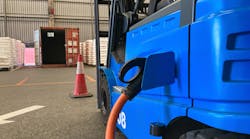Attendees of last month's ProMat show (www.mhia.org) saw the material handling industry round a major turning point in its evolution. Lift trucks could no longer be ignored.
In ProMats past, lift trucks were more window dressing than harbingers of technological change. Sexier technologies tended to steal attendees' attention away from the incremental changes announced by the old reliable lift truck OEMs. No more.
The major news announced at this year's show mirrored the megatrends capturing the imaginations of the world's business and political leaders: alternative fuel sources, productivity, occupational safety, ubiquitous information, information security—and lift trucks figured into each one of these topics.
Another sign of the lift truck's renewed role in material handling's evolution is Shankar Basu's presence on the MHIA's Roundtable of Industry Leaders. Basu is president and CEO of Toyota Material Handling USA (www.toyotaforklift.com), one of the industrial truck industry's major players. He just started a four-year term in this new capacity with MHIA.
If that's not enough to convince you of the lift truck's renewed role in influencing the art and science of material handling, listen to what MHIA's CEO, John Nofsinger, told me about what we can expect at next year's NA 2008 Show in Cleveland:
"We're assembling an energy and fuel focus. The time is right for the industry to raise awareness of all the alternatives, including fuel cells. MHIA needs to be working with what's on the Industrial Truck Association's (www.indtrk.org) radar and make sure there's continuity."
The industrial truck world is also evolving. Today, the market is all about service and utility, not just cost and capacity. Large corporations are under pressure to be efficient and are not inclined to tie up their resources by identifying 15 different material handling suppliers to get the lowest cost. Basu says he sees his industry becoming more consultative to take advantage of this trend.
"Fortune 500 companies are looking for just one place to go, including the maintenance part," he told me. "They just want material handling movement without tying up people to spec it and buy it. You have to look at different pieces of the material handling puzzle, and if lift trucks aren't it, that's okay."
This kind of thinking might have gotten him kicked out of the industrial truck industry 20 years ago. But in 2007 it's okay to admit that a plant laid out for a particular type of product might be better served by AGVs, for example, than by lift trucks.
Here are some other indicators of how the industrial truck OEMs are setting the pace. In Japan Toyota's logistics operations have already gone beyond industrial trucks and are helping clients apply racking and other types of material handling systems. Crown Equipment Corporation (www.crown.com) just opened a new manufacturing facility and sales operation in Suzhou, China. It will not only build equipment but it will also develop service teams made up of local talent.
Jungheinrich (www.jungheinrich-us.com) just introduced its rotating-cab lift truck to the U.S. Yale's Fleet Management and Financial Services arms (www.yale.com) are offering customized financing options. Raymond's Greene, NY, manufacturing facility (www.raymondcorp.com) is now doubling as a "living lab" to research fuel cell technology and fueling.
And because LiftOne (www.LiftOne.net), a dealer handling equipment from Cat, Linde, Komatsu, Ottawa/Kalmar, and Lift King, is now offering Hydrogenics' fuel cell power pack (www.hydrogenics.com) to customers, many lift truck users are now getting an early introduction to a promising source of alternative energy.
The lift truck is becoming a vehicle for change in industries around the world. Material handling is a richer art and more effective science for it.
Tom Andel has written about and been involved in the material handling industry for more than 26 years.




